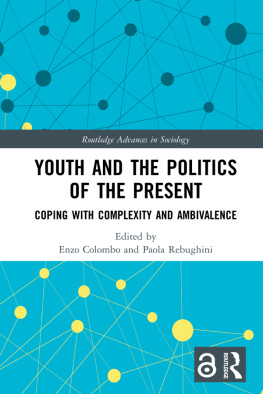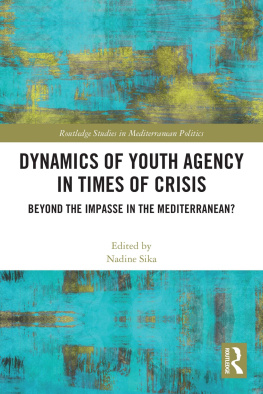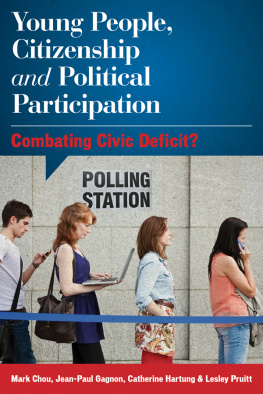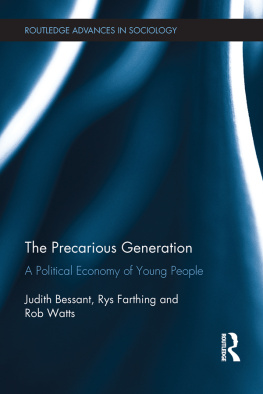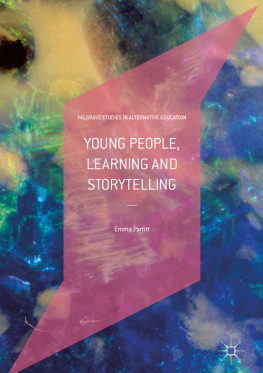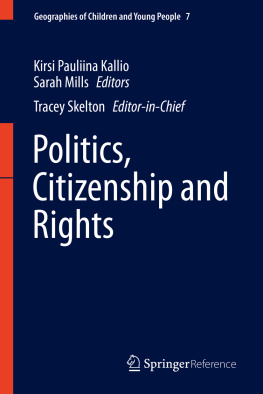YOUNG CITIZENS
This book is dedicated to my mother who did not see its completion
First published 2006 by Ashgate Publishing
Published 2016 by Routledge
2 Park Square, Milton Park, Abingdon, Oxon OX14 4RN
711 Third Avenue, New York, NY 10017, USA
Routledge is an imprint of the Taylor & Francis Group, an informa business
Copyright 2006 Eldin Fahmy
Eldin Fahmy has asserted his right under the Copyright, Designs and Patents Act, 1988, to be identified as the author of this work.
All rights reserved. No part of this book may be reprinted or reproduced or utilised in any form or by any electronic, mechanical, or other means, now known or hereafter invented, including photocopying and recording, or in any information storage or retrieval system, without permission in writing from the publishers.
Notice:
Product or corporate names may be trademarks or registered trademarks, and are used only for identification and explanation without intent to infringe.
British Library Cataloguing in Publication Data
Fahmy, Eldin
Young citizens : young peoples involvement in politics and decision making
1.Youth - Great Britain - Political activity 2.Youth
Great Britain - Attitudes 3.Great Britain - Politics and
government - 1997
I.Title
320.08350941
Library of Congress Cataloging-in-Publication Data
Fahmy, Eldin.
Young citizens : young peoples involvement in politics and decision making / by Eldin Fahmy.
p. cm.
Includes bibliographical references and index.
ISBN 0-7546-4259-3
1. Youth--Great Britain--Political activity. 2. Youth--Great Britain--Attitudes. 3. Political participation--Great Britain. I. Title
HQ799.G7.F34 2006
323.0420830941--dc22
2006005840
ISBN 9780754642596 (hbk)
Contents
List of Figures
List of Tables
Acknowledgements
There are many people to whom I am deeply indebted in seeing this project through to completion. Firstly, I would like to thank colleagues at the School for Policy Studies for their advice and support. It is invidious to single out particular individuals but I would especially like to thank Dave Gordon, Paul Burton and Christina Pantazis for their invaluable comments and commitment to my research. I am also indebted to Ruth Lister and Sue Middleton at the University of Loughborough, and Jane Aspden and Paul McCafferty at the Office of the Deputy Prime Ministers (ODPMs) Local Government Research Unit, for their many useful comments on earlier drafts of the work described here. This project would not have been possible without the financial support of the Economic and Social Research Council (ESRC) (Award: R00429734714) and a joint-funded ESRC/ODPM Research Fellowship (Award: PTA039270004). I am grateful for their financial support.
Many of the findings presented here are based upon secondary analysis of existing survey sources. I would like to acknowledge the contribution of the original data creators, depositors, and funders of these collections, together with the UK Data Archive specifically, NatCen/SCPR (1990-2002), Bynner et al. (1993), Heath et al. (1999), CEC (2002a), ONS (2002), Clarke et al. (2003) and Jowell et al. (2004a). Neither the original data creators and depositors, nor their funders or the UK Data Archive bear any responsibility for the analyses and interpretations presented here. The fieldwork for this research was conducted in the Bristol and Bath area and I would like to acknowledge the help of gatekeepers, too numerous to mention individually, who allowed me access to the young people interviewed here. Unfortunately, for reasons of confidentiality, I cannot adequately acknowledge the participation of the young people who kindly gave up their time to be interviewed but their participation is greatly valued.
Above all, I would like to thank my family and friends for their support and encouragement. I would especially like to thank my wife, Emma Williamson, for her limitless patience and support, and for helping to maintain my sanity in the face of such a massive task.
List of Abbreviations
| AT = Austria |
| BE = Belgium |
| CH = Switzerland |
| CZ = Czech Republic |
| DE = Germany |
| DK = Denmark |
| ES = Spain |
| FI = Finland |
| FR = France |
| GB = Great Britain |
| GR = Greece |
| HU = Hungary |
| IE = Ireland |
| IT = Italy |
| LU = Luxembourg |
| NL = Netherlands |
| NO = Norway |
| PL = Poland |
| PT = Portugal |
| SE = Sweden |
| SI = Slovenia |
Introduction
A Disconnected Generation?
Recent years have witnessed renewed concerns about the apparent disengagement of young people with conventional politics in Britain. Although concerns about the social and political situation of youth are far from new, current anxieties about young peoples political attitudes and participation first began to surface in the wake of the 1992 British General Election, and in the light of evidence suggesting that a large proportion of young people had chosen to abstain. In the run-up to both the 1997 and 2001 British General Election these anxieties were exacerbated by pre-election surveys reporting that many young people were equally unlikely to exercise their right to vote, viewing politics and politicians as boring, out of touch, and largely irrelevant to their own lives.
In the event, turnout in the 1997 British General Election dropped to a post-war low (71%) and turnout amongst young voters was especially disappointing. Based upon estimates derived from the 1997 British Election Survey, just 56% of all 1824 year olds turned out to vote. The 2001 British General Election marked a further step-change in the disengagement of UK citizens from electoral politics, with the lowest recorded turnout (59%) in a British General Election since 1918. As with earlier elections, young people were again prominent amongst those least inclined to vote in 2001, with estimates suggesting that just 39% of those 1824 year olds registered turned out on polling day (MORI, 2001).
Recorded turnout in the 2005 British General Election recovered slightly, with 61% of the UK electorate turning out to vote. However, there is little evidence so far that the age divide in electoral participation has narrowed significantly. Although reported turnout based upon survey estimates is but an imperfect guide to underlying rates of electoral participation, first results from the 2005 British Election Study suggest little room for complacency; fewer than half (48%) of 18 to 24 year olds claiming to have voted compared with three quarters (75%) of older sample respondents.
If young peoples electoral participation is disappointing, their participation in other, more intense forms of conventional political action gives even less cause for optimism. Young people are considerably less likely to be members of, or to be active within, the major electoral parties and are also less likely to engage in any form of conventional political action compared with older age groups. Young peoples under-representation within political and administrative elites is especially striking. Although the 1997 General Election returned more young Members of Parliament (MPs) than ever before, with 11 under the age of 30 (less than 2% of MPs), little subsequent progress has been made, and the wider political and administrative elite remains almost entirely middle-aged in composition.


